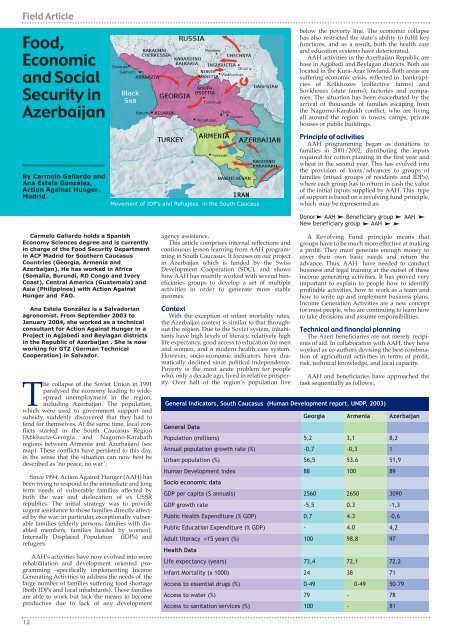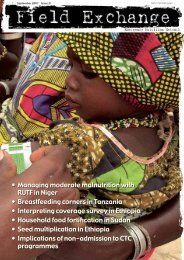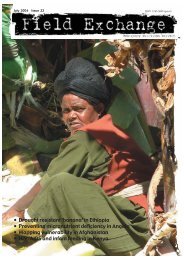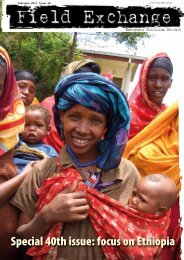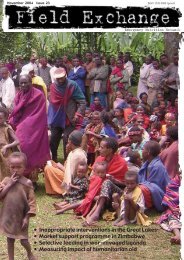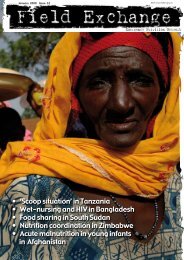Download PDF - Field Exchange - Emergency Nutrition Network
Download PDF - Field Exchange - Emergency Nutrition Network
Download PDF - Field Exchange - Emergency Nutrition Network
- No tags were found...
Create successful ePaper yourself
Turn your PDF publications into a flip-book with our unique Google optimized e-Paper software.
<strong>Field</strong> Article<br />
Food,<br />
Economic<br />
and Social<br />
Security in<br />
Azerbaijan<br />
By Carmelo Gallardo and<br />
Ana Estela González,<br />
Action Against Hunger,<br />
Madrid.<br />
Movement of IDP’s and Refugees in the South Caucaus<br />
below the poverty line. The economic collapse<br />
has also restricted the state’s ability to fulfil key<br />
functions, and as a result, both the health care<br />
and education systems have deteriorated.<br />
AAH activities in the Azerbaijan Republic are<br />
base in Agjabedi and Beylagan districts. Both are<br />
located in the Kura-Araz lowland. Both areas are<br />
suffering economic crisis, reflected in bankruptcies<br />
of Kolkhozes (collective farms) and<br />
Sovkhozes (state farms), factories and companies.<br />
The situation has been exacerbated by the<br />
arrival of thousands of families escaping from<br />
the Nagorno-Karabakh conflict, who are living<br />
all around the region in towns, camps, private<br />
houses or public buildings.<br />
Principle of activities<br />
AAH programming began as donations to<br />
families in 2001/2002, distributing the inputs<br />
required for cotton planting in the first year and<br />
wheat in the second year. This has evolved into<br />
the provision of loans/advances to groups of<br />
families (mixed groups of residents and IDPs),<br />
where each group has to return in cash the value<br />
of the initial inputs supplied by AAH. This type<br />
of support is based on a revolving fund principle,<br />
which may be represented as:<br />
Donor AAH Beneficiary group AAH<br />
New beneficiary group AAH<br />
Carmelo Gallardo holds a Spanish<br />
Economy Sciences degree and is currently<br />
in charge of the Food Security Department<br />
in ACF Madrid for Southern Caucasus<br />
Countries (Georgia, Armenia and<br />
Azerbaijan). He has worked in Africa<br />
(Somalia, Burundi, RD Congo and Ivory<br />
Coast), Central America (Guatemala) and<br />
Asia (Philippines) with Action Against<br />
Hunger and FAO.<br />
Ana Estela González is a Salvadorian<br />
agronomist. From September 2003 to<br />
January 2004, she worked as a technical<br />
consultant for Action Against Hunger in a<br />
Project in Agjabedi and Beylagan districts<br />
in the Republic of Azerbaijan . She is now<br />
working for GTZ (German Technical<br />
Cooperation) in Salvador.<br />
The collapse of the Soviet Union in 1991<br />
paralysed the economy leading to widespread<br />
unemployment in the region,<br />
including Azerbaijan. The population,<br />
which were used to government support and<br />
subsidy, suddenly discovered that they had to<br />
fend for themselves. At the same time, local conflicts<br />
started in the South Caucasus Region<br />
(Abkhazia-Georgia and Nagorno-Karabath<br />
regions between Armenia and Azerbaijan) (see<br />
map). These conflicts have persisted to this day,<br />
in the sense that the situation can now best be<br />
described as ‘no peace, no war’.<br />
Since 1994, Action Against Hunger (AAH) has<br />
been trying to respond to the immediate and long<br />
term needs of vulnerable families affected by<br />
both the war and dislocation of ex USSR<br />
republics. The initial strategy was to provide<br />
urgent assistance to those families directly affected<br />
by the war: in particular, exceptionally vulnerable<br />
families (elderly persons, families with disabled<br />
members, families headed by women),<br />
Internally Displaced Population (IDPs) and<br />
refugees.<br />
AAH’s activities have now evolved into more<br />
rehabilitation and development oriented programming<br />
-specifically implementing Income<br />
Generating Activities to address the needs of the<br />
large number of families suffering food shortage<br />
(both IDPs and local inhabitants). These families<br />
are able to work but lack the means to become<br />
productive due to lack of any development<br />
agency assistance.<br />
This article comprises internal reflections and<br />
continuous lesson learning from AAH programming<br />
in South Caucasus. It focuses on our project<br />
in Azerbaijan which is funded by the Swiss<br />
Development Cooperation (SDC), and shows<br />
how AAH has recently worked with several beneficiaries<br />
groups to develop a set of multiple<br />
activities in order to generate more stable<br />
incomes.<br />
Context<br />
With the exception of infant mortality rates,<br />
the Azerbaijan context is similar to that throughout<br />
the region. Due to the Soviet system, inhabitants<br />
have high levels of literacy, relatively high<br />
life expectancy, good access to education for men<br />
and women, and a modern health care system.<br />
However, socio-economic indicators have dramatically<br />
declined since political independence.<br />
Poverty is the most acute problem for people<br />
who, only a decade ago, lived in relative prosperity.<br />
Over half of the region’s population live<br />
A Revolving Fund principle means that<br />
groups have to be much more effective at making<br />
a profit. They must generate enough money to<br />
cover their own basic needs and return the<br />
advance. Thus, AAH have needed to conduct<br />
business and legal training at the outset of these<br />
income generating activities. It has proved very<br />
important to explain to people how to identify<br />
profitable activities, how to work as a team and<br />
how to write up and implement business plans.<br />
Income Generation Activities are a new concept<br />
for most people, who are continuing to learn how<br />
to take decisions and assume responsibilities.<br />
Technical and financial planning<br />
The Azeri beneficiaries are not merely recipients<br />
of aid. In collaboration with AAH, they have<br />
worked as co-authors devising the best combination<br />
of agricultural activities in terms of profit,<br />
risk, technical knowledge, and local capacity.<br />
AAH and beneficiaries have approached the<br />
task sequentially as follows:,<br />
General indicators, South Caucasus (Human Development report, UNDP, 2003)<br />
General Data<br />
Population (millions)<br />
Annual population growth rate (%)<br />
Urban population (%)<br />
Human Development index<br />
Socio economic data<br />
GDP per capita ($ annuals)<br />
GDP growth rate<br />
Public Health Expenditure (% GDP)<br />
Public Education Expenditure (% GDP)<br />
Adult literacy >15 years (%)<br />
Health Data<br />
Life expectancy (years)<br />
Infant Mortality (x 1000)<br />
Access to essential drugs (%)<br />
Access to water (%)<br />
Access to sanitation services (%)<br />
Georgia<br />
5,2<br />
-0,7<br />
56,5<br />
88<br />
2560<br />
-5,5 0.3<br />
0,7<br />
-<br />
Armenia<br />
3,1<br />
-0,3<br />
4.3<br />
100 98,8<br />
73,4<br />
24<br />
79<br />
Azerbaijan<br />
1<br />
100 89<br />
72,1<br />
38<br />
8,2<br />
53.6 51,9<br />
2650<br />
0-49 0-49<br />
100<br />
-1,3<br />
71<br />
- 81<br />
3090<br />
-0,6<br />
4.0 4,2<br />
97<br />
72,2<br />
- 78<br />
50-79<br />
12


